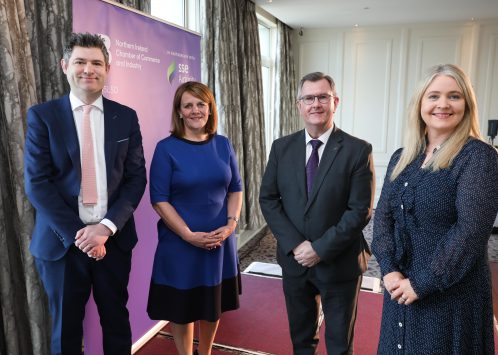Patrick Anderson, Chair of NI Chamber Infrastructure sub-committee
It may seem unorthodox to be discussing long term policy development at a time when the very political structures which will ultimately deliver any such policy are once again unstable. It may be even more perverse to be optimistic about the potential positive impact of new policy but that is where Northern Ireland Chamber of Commerce and Industry finds itself in regard to the NI Energy Strategy.
The NI Chamber Infrastructure Committee is cautiously optimistic, and Chair Patrick Anderson explains why.
In Northern Ireland we waited a long time for the emergence of a new Energy Strategy and we welcome its publication late last year. We strongly endorse the overall direction of the policy and in particular the emphasis on energy reform as a means of achieving net zero targets. We are also pleased to note the emphasis on sustainability and the cost of energy to the end user, commercial and domestic.
The argument that Northern Ireland as a region is too small to make a difference to the global drive towards decarbonisation has been rightly set aside and the goal of sourcing 70% of local electricity supplies from renewable sources by 2030 is ambitious, and we believe, achievable. Industry here has led the way in developing onshore wind projects, indeed targets for renewable energy have consistently been exceeded in the past decade. If we are to keep up that record – and we must if we are to meet the targets in this Energy Strategy – then we need clear objectives and routes to market not only for onshore wind but ultimately for offshore as well.
The ability to move through key strategic planning decisions at speed, for all aspects of the Energy Strategy, including projects and grid infrastructure, is extremely important. The Department for Infrastructure has begun a review of energy related planning policy, which is to be welcomed, and that process must be taken forward urgently.
The targets within the Energy Strategy are welcome, they are necessary, but we need to map out how decarbonisation can be advanced. The further publication, last month, of The Path To Net Zero Energy Action Plan 2022 is a welcome step, as it begins to set the policy direction that can deliver on the targets.
Across the energy sector, academics and representative groups are already looking at innovative ways to decarbonise energy sources and move towards a net zero carbon emissions future. When politics partners industry we can achieve the targets within the Strategy.
The success we have had to date in exceeding previous targets, in developing hydrogen fuelled buses, in delivering a viable onshore renewable energy sector has been built on having the right skills in place. This will become more apparent and more important as we transform our energy sector. It is another area where collegiate working across Departments and between Ministers needs to happen. This will require careful planning in ensuring that the education and training channels available mean that not only can the supply of skills meet emerging demand but also that the skills piece actually drives demand through ideas generation and innovation. The role of all aspects of the educational spectrum will be critical, particularly the vocational education route because flexibility will be a key element of the skills response process.
The Energy Strategy has been driven to date by the Department for Economy, understandably so. But what has been clear is that it is an Executive strategy, with clear roles and responsibilities being allocated in the action plan. The issue of Energy cuts across so many of our central Government Departments as well as local authorities that we believe that serious consideration should be given to the creation of an oversight body.
It is deeply unfortunate that once again political uncertainty has shaken the political system. However the damage does not need to be fatal and we believe that given the widespread welcome for the Energy Strategy, the plan is strong enough to emerge from the coming election and any associated short term political hiatus intact. The early stages, as set out in the action plan, are vital, as they will need to begin legislative and cultural changes that will be fundamental to the strategy’s success.


